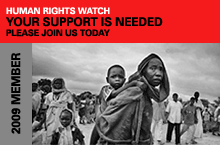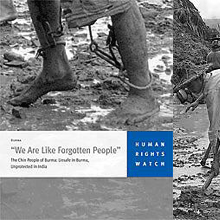 60 Kilos explores how policy intended to improve cities actually impacts the livelihoods of the poor in fundamental ways. It uses waste as an entry point and examines the interplay of widespread corruption, poverty, privatization of municipal services and criminalization of the informal recycling sector in Delhi , India. It was mostly shot earlier this year in one of Delhi's so called 'most dangerous neighborhoods' and challenges many given ideas about development and the poor. A Film by Vishal Bhargava & Bharati Chaturvedi, © 2006. More...
60 Kilos explores how policy intended to improve cities actually impacts the livelihoods of the poor in fundamental ways. It uses waste as an entry point and examines the interplay of widespread corruption, poverty, privatization of municipal services and criminalization of the informal recycling sector in Delhi , India. It was mostly shot earlier this year in one of Delhi's so called 'most dangerous neighborhoods' and challenges many given ideas about development and the poor. A Film by Vishal Bhargava & Bharati Chaturvedi, © 2006. More...
Wednesday, February 25, 2009
60 Kilos
 60 Kilos explores how policy intended to improve cities actually impacts the livelihoods of the poor in fundamental ways. It uses waste as an entry point and examines the interplay of widespread corruption, poverty, privatization of municipal services and criminalization of the informal recycling sector in Delhi , India. It was mostly shot earlier this year in one of Delhi's so called 'most dangerous neighborhoods' and challenges many given ideas about development and the poor. A Film by Vishal Bhargava & Bharati Chaturvedi, © 2006. More...
60 Kilos explores how policy intended to improve cities actually impacts the livelihoods of the poor in fundamental ways. It uses waste as an entry point and examines the interplay of widespread corruption, poverty, privatization of municipal services and criminalization of the informal recycling sector in Delhi , India. It was mostly shot earlier this year in one of Delhi's so called 'most dangerous neighborhoods' and challenges many given ideas about development and the poor. A Film by Vishal Bhargava & Bharati Chaturvedi, © 2006. More...
Labels:
India - Delhi
Friday, February 20, 2009
Sri Lanka: End ‘War’ on Civilians
 Army Shells and Detains Displaced Persons, Tamil Tigers Prevent Their Flight. The Sri Lankan government should immediately cease its indiscriminate artillery attacks on civilians in the northern Vanni region and its policy of detaining displaced persons in internment camps, Human Rights Watch said in a report released today. Since early January 2009, civilian casualties have skyrocketed in the fighting between the Sri Lankan armed forces and the separatist Liberation Tigers of Tamil Eelam. More...
Army Shells and Detains Displaced Persons, Tamil Tigers Prevent Their Flight. The Sri Lankan government should immediately cease its indiscriminate artillery attacks on civilians in the northern Vanni region and its policy of detaining displaced persons in internment camps, Human Rights Watch said in a report released today. Since early January 2009, civilian casualties have skyrocketed in the fighting between the Sri Lankan armed forces and the separatist Liberation Tigers of Tamil Eelam. More...
Labels:
Sri Lanka
Tuesday, February 17, 2009
UN: Send More Troops to DR Congo
 Urgent Security Council Action Needed as LRA Attacks on Civilians Escalate. The United Nations Security Council should act with urgency to send additional peacekeepers to northern Democratic Republic of Congo, where the rebel Lord’s Resistance Army (LRA) continues its brutal attacks on civilians, Human Rights Watch said in a report released today. The Security Council is expected to discuss the situation in Congo on February 17, 2009. More...
Urgent Security Council Action Needed as LRA Attacks on Civilians Escalate. The United Nations Security Council should act with urgency to send additional peacekeepers to northern Democratic Republic of Congo, where the rebel Lord’s Resistance Army (LRA) continues its brutal attacks on civilians, Human Rights Watch said in a report released today. The Security Council is expected to discuss the situation in Congo on February 17, 2009. More...
Labels:
Congo
Monday, February 16, 2009
UN: Strengthen Action to End Use of Child Soldiers
 Ex-Child Soldiers, Other Youth Appeal to Secretary-General on Treaty Anniversary. Former child soldiers and other youth representing a grassroots campaign from around the world will present thousands of symbolic "red hands" to Secretary-General Ban Ki-moon today to demand stronger action by international leaders to end the use of child soldiers.
Ex-Child Soldiers, Other Youth Appeal to Secretary-General on Treaty Anniversary. Former child soldiers and other youth representing a grassroots campaign from around the world will present thousands of symbolic "red hands" to Secretary-General Ban Ki-moon today to demand stronger action by international leaders to end the use of child soldiers.A UN treaty prohibiting the forced recruitment or use of children under the age of 18 in armed conflict, the Optional Protocol to the Convention on the Rights of the Child on the involvement of children in armed conflict, has been ratified by 126 countries and entered into force on February 12, 2002, a date commemorated annually as "Red Hand Day." But child soldiers are still being used in 15 countries or territories, including some that have ratified the treaty. More...
Labels:
Child Soldiers
Thursday, February 5, 2009
ICC First Warrants Requested for Attacks Darfur Peacekeepers
 The request on November 20 by the prosecutor of the International Criminal Court for arrest warrants for three rebel leaders believed to be responsible for attacks on international peacekeepers in Darfur is an important step toward protecting those who protect civilians, Human Rights Watch said today. Repeated attacks on international peacekeepers have severely compromised the effectiveness of peacekeeping operations in Darfur. More...
The request on November 20 by the prosecutor of the International Criminal Court for arrest warrants for three rebel leaders believed to be responsible for attacks on international peacekeepers in Darfur is an important step toward protecting those who protect civilians, Human Rights Watch said today. Repeated attacks on international peacekeepers have severely compromised the effectiveness of peacekeeping operations in Darfur. More...
Burma/India: End Abuses in Chin State
 Burma’s military government should end human rights abuses against the ethnic Chin population in Burma’s western Chin state, Human Rights Watch said in a report released today. Human Rights Watch also called on the Indian government and newly elected Mizoram state government to extend protection to Chin who have fled to neighboring India to escape ongoing abuses and severe repression in Burma. More...
Burma’s military government should end human rights abuses against the ethnic Chin population in Burma’s western Chin state, Human Rights Watch said in a report released today. Human Rights Watch also called on the Indian government and newly elected Mizoram state government to extend protection to Chin who have fled to neighboring India to escape ongoing abuses and severe repression in Burma. More...DR Congo: Arrest Bosco Ntaganda
 The government of the Democratic Republic of Congo should arrest Bosco Ntaganda, a former rebel commander charged with war crimes by the International Criminal Court (ICC), Human Rights Watch said today in a public letter to President Joseph Kabila. Human Rights Watch expressed deep concern that the government is considering appointing Ntaganda to a top position in the Congolese army, despite the accusations that he had responsibility for using child soldiers, as well as for committing several atrocities in Ituri district in northeastern Congo. More...
The government of the Democratic Republic of Congo should arrest Bosco Ntaganda, a former rebel commander charged with war crimes by the International Criminal Court (ICC), Human Rights Watch said today in a public letter to President Joseph Kabila. Human Rights Watch expressed deep concern that the government is considering appointing Ntaganda to a top position in the Congolese army, despite the accusations that he had responsibility for using child soldiers, as well as for committing several atrocities in Ituri district in northeastern Congo. More...
Tuesday, February 3, 2009
Child Labor Banned in India
 Indian law already prohibits the employment of children under 14 in "hazardous" industries. Yet child labor remains widespread in India, despite the country's emerging economic power. At least 12 million Indian children work instead of going to school, according to government estimates. Advocacy groups say the real figure could be as high as 60 million. Image: An Indian woman holds the hand of her eight-year-old daughter after she hammered her finger last year while breaking rocks on the banks of a river in Siliguri, India. More...
Indian law already prohibits the employment of children under 14 in "hazardous" industries. Yet child labor remains widespread in India, despite the country's emerging economic power. At least 12 million Indian children work instead of going to school, according to government estimates. Advocacy groups say the real figure could be as high as 60 million. Image: An Indian woman holds the hand of her eight-year-old daughter after she hammered her finger last year while breaking rocks on the banks of a river in Siliguri, India. More...
Labels:
India
Child Labour
 An estimated 158 million children aged 5-14 are engaged in child labour, one in six children in the world. Millions of children are engaged in hazardous situations or conditions, such as working in mines, working with chemicals and pesticides in agriculture or working with dangerous machinery. They are everywhere but invisible, toiling as domestic servants in homes, labouring behind the walls of workshops, hidden from view in plantations: In Sub-Saharan Africa around one in three children are engaged in child labour, representing 69 million children; In South Asia, another 44 million are engaged in child labour; The latest national estimates for this indicator are reported in Table 9 (Child Protection) of UNICEF's annual publication The State of the World's Children. More...
An estimated 158 million children aged 5-14 are engaged in child labour, one in six children in the world. Millions of children are engaged in hazardous situations or conditions, such as working in mines, working with chemicals and pesticides in agriculture or working with dangerous machinery. They are everywhere but invisible, toiling as domestic servants in homes, labouring behind the walls of workshops, hidden from view in plantations: In Sub-Saharan Africa around one in three children are engaged in child labour, representing 69 million children; In South Asia, another 44 million are engaged in child labour; The latest national estimates for this indicator are reported in Table 9 (Child Protection) of UNICEF's annual publication The State of the World's Children. More...
Labels:
World
Children working in Sierra Leone mines
 Child labour problems remain unsolved in post-war Sierra Leone, where thousands of youngsters continue to work in mines. Children as young as seven work at the mines During Sierra Leone's 10 year civil war, children were used as combatants and labourers in the diamond mines of Koidu in the north-eastern district of Kono. With the war over, government's efforts to get them out of the mines and back into schools are proving to be painfully slow. No-one seems to know the exact number of children working at the diamond mines in Koidu, because with every passing day, more youngsters drift into these mines. More...
Child labour problems remain unsolved in post-war Sierra Leone, where thousands of youngsters continue to work in mines. Children as young as seven work at the mines During Sierra Leone's 10 year civil war, children were used as combatants and labourers in the diamond mines of Koidu in the north-eastern district of Kono. With the war over, government's efforts to get them out of the mines and back into schools are proving to be painfully slow. No-one seems to know the exact number of children working at the diamond mines in Koidu, because with every passing day, more youngsters drift into these mines. More...
Labels:
Sierra Leone
Monday, February 2, 2009
China's growing underclass
 Internal migrant workers in Chiona are paying the cost of the country's economic miracle". Most find themselves denied their rights - shut out of the healthcare system and state education, living in appalling, overcrowded conditions and routinely exploited by their employers. More...
Internal migrant workers in Chiona are paying the cost of the country's economic miracle". Most find themselves denied their rights - shut out of the healthcare system and state education, living in appalling, overcrowded conditions and routinely exploited by their employers. More...
Labels:
China
Saudi Arabia: Amnesty International calls for end to arrests and expulsions of foreign migrant workers on discriminatory grounds
Amnesty International is calling on the Saudi Arabian government to halt expulsions of foreign migrant workers on account of their religious beliefs and affiliations.
The organization made this call after at least 14 foreign nationals, all migrant workers and members of their families from different countries, were expelled from Saudi Arabia during the past week. The workers, most of whom had been employed in Saudi Arabia for years, were all ordered to leave the country apparently because of their actual or suspected connection with the Ahmadiyya Community, a religious community which considers itself a sect of Islam. None are known to have been charged with any criminal offences, let alone tried and convicted. More...
The organization made this call after at least 14 foreign nationals, all migrant workers and members of their families from different countries, were expelled from Saudi Arabia during the past week. The workers, most of whom had been employed in Saudi Arabia for years, were all ordered to leave the country apparently because of their actual or suspected connection with the Ahmadiyya Community, a religious community which considers itself a sect of Islam. None are known to have been charged with any criminal offences, let alone tried and convicted. More...
Labels:
Saudi Arabia
South Korea: Migrant workers exploited and abused
Tens of thousands of migrant workers in South Korea face discrimination, exploitation and appalling working conditions, according to a new report by Amnesty International. Many face a spiral of debt and are forced to work illegally because their employers withhold their salaries and existing laws make it hard to change jobs legally.
South Korea is the first country in Asia to protect the rights of migrant workers in law. But two years after the Act Concerning Employment Permit for Migrant Workers (EPS Act) came into force on 17 August 2004, foreign workers still face multiple abuses, industrial hazards and few possibilities for obtaining redress, according to Amnesty International's findings. More...
South Korea is the first country in Asia to protect the rights of migrant workers in law. But two years after the Act Concerning Employment Permit for Migrant Workers (EPS Act) came into force on 17 August 2004, foreign workers still face multiple abuses, industrial hazards and few possibilities for obtaining redress, according to Amnesty International's findings. More...
Labels:
South Korea
Jordan: Drastic improvement needed for domestic works
Tens of thousands of domestic workers in Jordan live in appalling conditions with many forced to work up to 19 hours per day and denied their salary. Amnesty International is urging the Jordanian authorities to ensure that the current review of employment regulations leads to a drastic improvement in their working conditions.
Jordan has some 40,000 registered women migrant domestic workers. Many come from South and South East Asia, mostly from Indonesia, the Philippines and Sri Lanka. According to recent Amnesty International research, the majority of these women are abused and exploited with little or no protection from the authorities. More...
Jordan has some 40,000 registered women migrant domestic workers. Many come from South and South East Asia, mostly from Indonesia, the Philippines and Sri Lanka. According to recent Amnesty International research, the majority of these women are abused and exploited with little or no protection from the authorities. More...
Labels:
Jordan
Subscribe to:
Posts (Atom)







